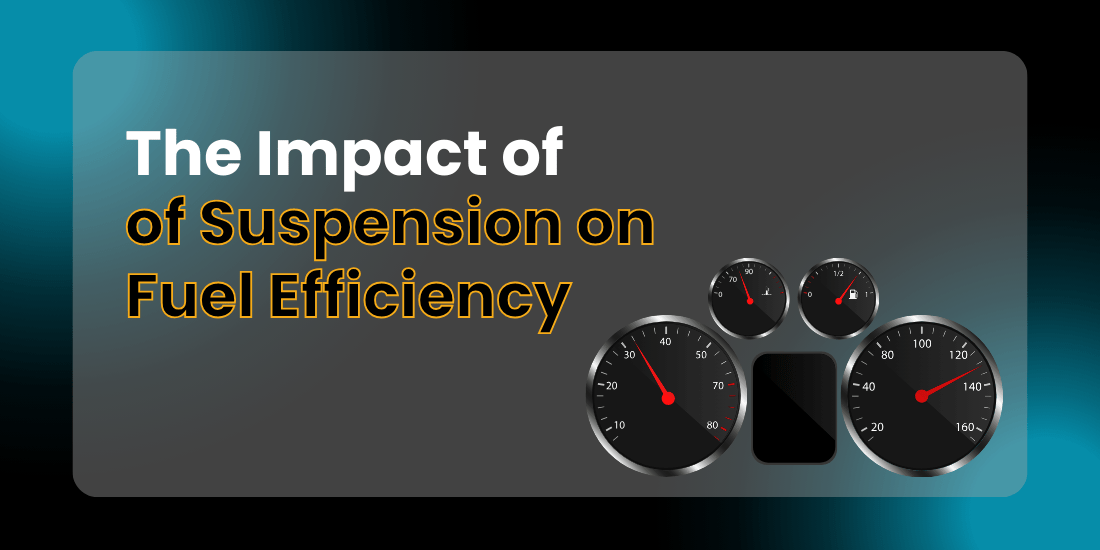The Role of Shock Absorbers
Functions of Shock Absorbers
Energy Dissipation
Damping
Controlling Body Roll
How Shock Absorbers Affect Vehicle Handling and Safety?
Tire Grip and Traction
Stability and Control
Braking Performance
Comfort and Ride Quality
The Link Between Shock Absorbers and Fuel Efficiency
The Impact of Shock Absorbers on Fuel Efficiency
1. Impact of Rough Road Surfaces
The state of road surfaces and the energy absorption by shock absorbers are directly linked to fuel consumption. Here’s how:
- Energy Dissipation and Suspension Oscillations
Uneven or rough roads trigger excessive vertical movements within the suspension system, causing the vehicle to bounce and oscillate. This is where shock absorbers come into play. They are designed to dissipate the energy generated by these movements. Inadequate shock absorber performance leads to poor energy dissipation, resulting in prolonged suspension oscillations. This not only affects ride comfort but also has an adverse impact on fuel consumption. When the suspension continuously oscillates due to poorly functioning shock absorbers, it forces the engine to work harder to maintain vehicle stability. This additional strain on the engine translates into higher fuel consumption. - Fuel Consumption on Rough Roads
On uneven or rough road surfaces, vehicles equipped with worn-out or ineffective shock absorbers experience reduced tire contact with the road. This results in increased rolling resistance and tire slippage. The engine is then compelled to exert more power to overcome these resistance forces, leading to higher fuel consumption. Furthermore, the vibrations induced by inadequate shock absorption can disrupt engine efficiency, further compounding the issue of increased fuel consumption.
2. Vibration and Suspension Efficiency
Shock absorbers have a profound influence on the reduction of vibrations and the optimization of suspension efficiency. Both factors play a critical role in fuel efficiency
- Vibration Damping and Tire Grip
Effective shock absorbers are adept at damping the vibrations transmitted through the suspension system. Excessive vibrations can cause the tires to lose their grip on the road, leading to reduced traction. When traction is compromised, the vehicle’s stability is affected, and the driver may need to compensate by applying more throttle or braking inputs. This not only compromises safety but also increases fuel consumption. The loss of traction necessitates additional engine power to maintain vehicle control, which translates into higher fuel consumption. - Effects of Excessive Vibration on Fuel Efficiency
In addition to affecting tire grip and fuel efficiency, excessive suspension vibration can cause discomfort and fatigue for vehicle occupants. The driver may be compelled to make abrupt and compensatory adjustments to maintain control in response to the harsh vibrations. These sudden adjustments, such as aggressive braking or acceleration, contribute significantly to increased fuel consumption.
Optimizing Shock Absorber Performance for Improved Fuel Efficiency
Choosing the Right Shock Absorbers
Upgrading to High-Performance Shock Absorbers
Maintaining Optimal Tire Pressure
Balancing Load Distribution
Conclusion
Shock absorbers are often underappreciated when it comes to fuel efficiency, but their impact should not be underestimated. By understanding the role of shock absorbers and their connection to mileage, vehicle owners can make informed decisions to optimize their performance. From choosing the right shock absorbers to implementing proper maintenance and driving techniques, improving fuel efficiency becomes an achievable goal.
As automotive technology continues to evolve, the future holds even more promise with innovative shock absorber designs that adapt to changing road conditions. By taking the necessary steps to maximize shock absorber efficiency, we can contribute to both fuel savings and a greener, more sustainable future on the roads.

